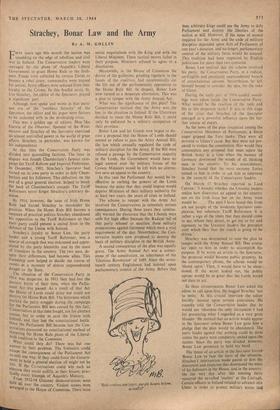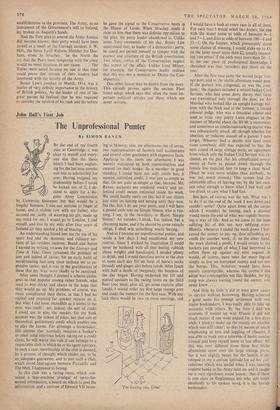Strachey, Bonar Law and the Army
By A. M. GOLLIN UIFTY years ago this month the nation was 1 trembling on the edge of rebellion and civil war in Ireland. The Conservative leaders were outraged by the plans of Asquith's Liberal Government to grant Home Rule to the Irish- men. Funds were collected by certain Tories to finance a rebel army; commandos were trained for action; Army officers were seduced from their loyalty to the Crown. In this fearful crisis, St. Loe Strachey, the editor of the Spectator, played a significant part.
Although men spoke and wrote in that parti- san era of the 'toothless ferocity' of the Spectator, the editor and his paper were factors to be reckoned with in the developing crisis.
This was a golden age of editors. Men like Garvin of the Observer, Spender of the West- minster and Strachey of the Spectator exercised an almost unrivalled power in the world of great affairs. Strachey, in particular, was known for his independence.
At this time the Conservative Party was divided into quarrelling factions. The issue in dispute was Joseph Chamberlain's famous cam- paign for Tariff Reform and Imperial Preference. In December, 1905, Strachey's Spectator had turned on its own party in order to defy Cham- berlain and his followers. This defection, on the eve of a great general election, helped to break the back of Chamberlain's crusade. The Tariff Reformers never forgot Strachey's arbitrary de- cision.
By 1914, however, the issue of Irish Home Rule had forced Strachey to reconsider his Position. When the Home Rule Bill became a measure of practical politics Strachey abandoned his opposition to the Tariff Reformers so that their party could present a united front in the defence of the Union with Ireland.
Strachey's loyalty to Bonar Law, the party leader and a strong Tariff Reformer, was a source of strength that was welcomed and appre- ciated by the party hierarchy and by the mass of Unionists in the country. The two men, de- spite their differences, had become allies. This friendship now helped to decide the course of events at a moment of almost unprecedented danger to the State.
The situation of the Conservative Party in 1914 was desperate. In 1911 they had lost the decisive battle of their time, when the Parlia- ment Act was passed. As a result of that Act the House of Lords could delay but could not destroy the Home Rule Bill. The bitterness which marked the party struggle during the campaign for the Parliament Bill was caused by this fact; Conservatives at that time fought, not for abstract causes, but in order to save the Union with Ireland, and they lost the constitutional battle. Once the Parliament Bill, became law the Con- servatives possessed no constitutional method of thwarting the Home Rule plans of the Liberal- Irish coalition in the Commons. What could they do? There was but one answer to their problem. The Unionists could escape the consequences of the Parliament Act In only one way. If they could force the Govern- ment to hold a general election all might not be lost. If the Conservatives could win such an election they could nullify, at their leisure, prac- tically every triumph of Asquith's Ministry. From 1912-14 Unionist demonstrations were held all over the country. Violent scenes were arranged in the House of Commons. There were
secret negotiations with the King and with the Liberal Ministers. These tactical moves failed in their purpose. Ministers refused to agree to a dissolution.
Meanwhile, in the House of Commons the device of the guillotine, grinding regularly in the hands of the coalition, had systematically cut the life out of the parliamentary opposition to the Home Rule Bill. In despair, Bonar Law now turned to a desperate alternative. This was a plan to tamper with the Army Annual Act.
What was the significance of this plan? The Conservatives realised that the Army was the key to the situation in Ireland. If the Ulstermen decided to resist the Home Rule Bill, it could only be enforced by a military occupation of their province.
Bonar Law and his friends now began to dis- cuss a proposal that the House of Lords should amend or refuse to pass the Army Annual Bill, the law which annually regulated the code of military discipline for the Army. If the Bill were refused a passage by the Conservative majority in the Lords, the Government would have no legal control over the military forces of the Crown. Ministers would be left with no alterna- tive save an appeal to the country.
In this case the Parliament Act would be in- effective in curbing the powers of the Lords because the delay that they could impose would deprive Ministers of their military authority for at least two years, the years of crisis in Ireland. The scheme to tamper with the Army Act involved the Conservatives in extremely serious consequences. During these years they continu- ally warned the electorate that the Liberals were unfit for high office because the Radical tail of that party refused to sanction those military preparations against Germany which were a vital requirement of the day. Nevertheless, the Con- servative leaders now proposed to destroy the basis of military discipline in the British Army.
A second consequence of the plan was equally grave. The Army Annual Act was a corner- stone of the constitution, an inheritance of the 'Glorious Revolution' of 1689. Since the seven- teenth century Englishmen had insisted upon parliamentary control of the Army. Before that
'Soft centres top layer, purple hearts below, actually!'
time arbitrary kings could use the Army to defy Parliament and destroy the liberties of the nation at will. However, if the sums of money required for the Army and the code of military discipline depended upon Acts of Parliament of one year's duration, and no longer, parliamentary control of the military force would be assured. This tradition had been respected by English politicians for more than two centuries.
Bonar Law realised that the scheme involved his party, the Conservative Party, in a radical, un-English and absolutely unprecedented breach of constitutional custom. Nevertheless, he felt himself bound to consider the idea, for the sake of Ulster.
During the early part of 1914 careful sound- ings were taken inside the Conservative Party. What would be the reaction Of the rank and file to this desperate tactic? It was at this stage of the crisis that Strachey of the Spectator emerged as a powerful influence upon the fur- ther course of events.
As the news of the plan circulated among the Conservative Members of Parliament, a fierce anger gripped the Tory ranks. They were all devoted to Ulster's cause. But they were not pre- pared to violate the constitution. Nor would they contemplate any proposal that must injure the British Army at a time when the menace of Germany dominated the minds of all thinking men in the country. To his astonishment, Strachey found that the most extreme Tories turned to him in order to ask him to intervene in the councils of the Conservative leaders.
On' March 17 Strachey reported to Lord Curzon: 'I wonder whether the Unionist leaders realise how disastrous an appeal to the country not on the Irish issue but on the Army issue would be. . . . The men I have heard this from are not people of the moderate Spectator com- plexion, but vehement Tariff Reformers. It is rather a sign of the times that they should come to me, whom they detest, to get me to try and represent to the Unionist leaders the precipice over which they fear the coach is going to be driven.'
Strachey was determined to ruin the plan to tamper with the Army Annual Bill. One course lay open to him in order to accomplish his purpose. If he wrote an article in the Spectator, the proposal would become public property. In the contemporary phrase, the scheme would be 'blown upon.' Then, it would have to be aban- doned. if the secret leaked out, the public uproar would be so great that the Lords would not dare to act.
In these circumstances Bonar Law asked the editor to call upon him. He begged Strachey 'not to write.' At this crucial interview the editor harshly insisted upon certain assurances. He roundly told the Conservative 'leader that he would not 'abandon- the only instrument I had for preventing what I regarded as a very great blunder.' He insisted that an article would appear in the Spectator unless Bonar Law gave him a pledge that the plan would be abandoned. The party leader agreed that nothing could be done unless the party were completely united upon the matter. Since the party was divided, however, Bonar Law promised to hold his hand.
The threat of an article in the Spectator forced- Bonar Law to face the facts of the situation. Strachey's intervention made patent to him the discontent and suspicion that dominated the mass of his followers in the House, and in the country. On the very day after this meeting there occurred the so-called 'mutiny' at the Curragh. Certain officers in Ireland refused to advance into Ulster in order to protect military stores and
establishments in the province. The Army, as an instrument of the Government's will in Ireland, lay broken in Asquith's hands.
Had the Tory plan to amend the Army Annual Bill become known, their party would have been ruined as a result of the Curragh incident. J. W. Hills, the fierce Tariff Reform qember for Dur- ham, wrote to Strachey : 'In the North the cry that the Peers were tampering with the army would be most injurious to our cause. . . .' The Tories were saved because no one at that time could prove that certain of their leaders had interfered with the loyalty of the Army.
Bonar Law's, conduct in March, 1914, was a matter of very definite importance in the history of British politics. As the leader of one of the great parties he realised that he was required to consider the opinion of his rank and file before
he gave the signal to the Conservative hosts in the House of Lords. When Strachey made it clear to him that there was definite opposition to the plan, the party leader abandoned it. Unlike some Tory extremists of his day, Bonar Law understood that, as leader of a democrati■ party, he could not permit himself to tamper with the essence and structure of the British constitution. Too often, critics of the Conservatives neglect this aspect of the affair. Unlike Lord Milner, for example, the Conservative leader realised that this was not a moment to 'Damn the Con- sequences.'
One other lesson may be drawn from the story. This episode proves again the ancient Fleet Street adage which says that often the most im- portant political articles are those which are never written.









































 Previous page
Previous page